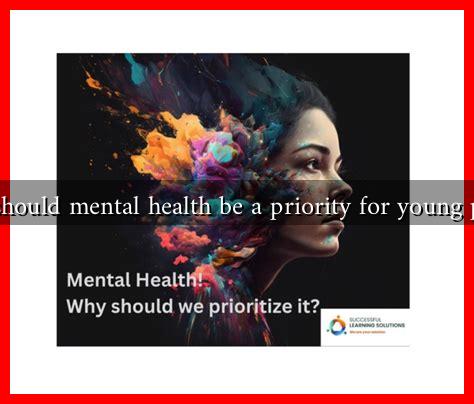-
Table of Contents
Why Should Mental Health Be a Priority for Young People?
In recent years, mental health has emerged as a critical issue, particularly among young people. With the pressures of modern life, including academic demands, social media influence, and the ongoing effects of global events, prioritizing mental health is more important than ever. This article explores the reasons why mental health should be a top priority for young individuals, supported by statistics, case studies, and expert opinions.
The Current State of Youth Mental Health
According to the World Health Organization (WHO), mental health conditions are on the rise among young people. A report from the National Institute of Mental Health (NIMH) indicates that:
- Approximately 1 in 5 adolescents aged 13-18 experience a severe mental disorder at some point in their lives.
- Suicide is the second leading cause of death among individuals aged 10-24.
- Over 60% of youth with mental health issues do not receive the necessary treatment.
These statistics highlight a pressing need for increased awareness and resources dedicated to mental health among young people. The stigma surrounding mental health often prevents individuals from seeking help, making it crucial to foster an environment where mental well-being is openly discussed and prioritized.
Impact of Mental Health on Academic Performance
Mental health significantly influences academic performance. Young people facing mental health challenges often struggle with concentration, motivation, and overall engagement in their studies. A study published in the journal Psychological Medicine found that:
- Students with mental health issues are more likely to have lower grades and higher dropout rates.
- Those who receive mental health support show improved academic outcomes and increased school attendance.
For instance, a case study from a high school in California implemented a mental health program that provided counseling and support services. As a result, the school reported a 20% increase in graduation rates over three years, demonstrating the positive correlation between mental health support and academic success.
The Role of Social Media
Social media plays a dual role in the mental health of young people. While it can foster connections and provide support, it can also contribute to anxiety, depression, and low self-esteem. A survey conducted by the Pew Research Center found that:
- Over 70% of teens believe that social media has a significant impact on their mental health.
- Many report feeling pressure to present a perfect image online, leading to feelings of inadequacy.
To combat these negative effects, it is essential for young people to develop healthy social media habits and for parents and educators to guide them in navigating these platforms responsibly.
Building Resilience and Coping Skills
Prioritizing mental health helps young people build resilience and coping skills that are essential for navigating life’s challenges. Programs that focus on mental health education can equip youth with tools to manage stress, anxiety, and other emotional difficulties. Some effective strategies include:
- Mindfulness and meditation practices to enhance emotional regulation.
- Peer support groups that foster open discussions about mental health.
- Workshops on stress management and coping techniques.
For example, a program implemented in schools across New Zealand has shown that teaching mindfulness can lead to a 30% reduction in anxiety levels among students, illustrating the effectiveness of proactive mental health education.
Conclusion: A Call to Action
In conclusion, prioritizing mental health for young people is not just beneficial; it is essential. The alarming statistics surrounding youth mental health, the impact on academic performance, the influence of social media, and the importance of resilience all underscore the need for immediate action. By fostering an environment that values mental well-being, we can empower young individuals to thrive academically, socially, and emotionally.
As a society, we must advocate for better mental health resources, reduce stigma, and promote open conversations about mental health. For more information on mental health resources and support, visit the National Alliance on Mental Illness (NAMI) at nami.org.


